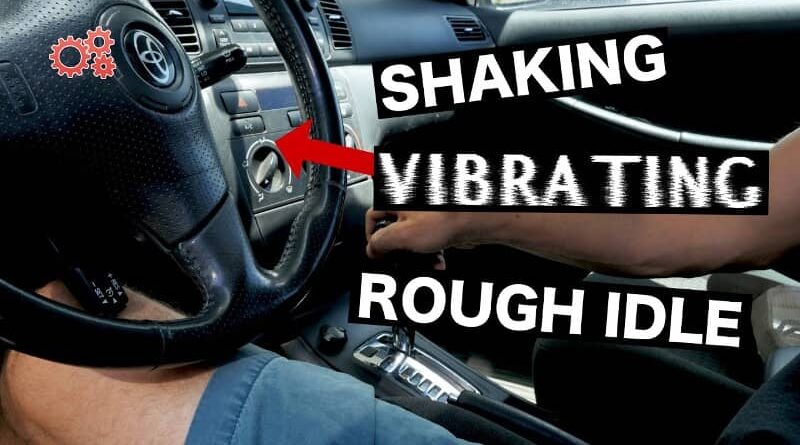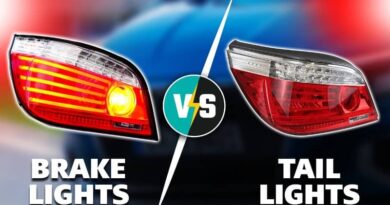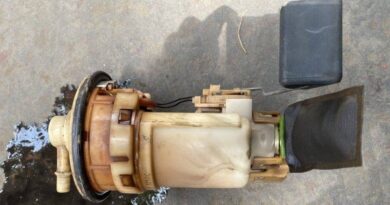
Imagine being parked at a stoplight in your car and then unexpectedly feeling an unfamiliar jolt resonating through the vehicle. It’s natural to feel uneasy when your car is shaking and rattling.
Your confusion might increase if you notice that speeding up after a stoplight turns green makes your car shake less.
You’ll find that many individuals have experienced the same predicament, a frequent occurrence among many car owners is experiencing shaking while parked, which disappears as soon as they hit the road.
When your car shakes at idle but smooths out while driving, it indicates an underlying issue with the engine or its components. The engine operates differently at idle compared to when the vehicle is in motion, and this disparity can reveal specific problems.
Taking prompt action on these concerns can prevent lasting damage and equip your car for optimal performance.
This video will let you examine some of this problem’s potential root causes and suggest solutions to restore worry-free and normal driving.
Understanding the Causes of Car Shaking at Idle
Several factors can contribute to a car shaking at idle. Let’s delve into some common culprits:
Engine Misfire
One possible cause of a car shaking at idle is an engine misfire. This occurs when the engine’s cylinders fail to ignite the air-fuel mixture properly. As a result, the engine runs unevenly, causing noticeable vibrations.
Vacuum Leaks
Vacuum leaks occur when there are unintended openings in the engine’s vacuum system. These leaks disrupt the balance of air and fuel, causing the engine to run rough and shake at idle.
Dirty Fuel Injectors
Over time, fuel injectors can become clogged with deposits and impurities. When this happens, they fail to deliver fuel to the engine efficiently, leading to an uneven idle and shaking.
Uneven Engine Compression
If the compression levels in your engine’s cylinders are inconsistent, it can result in a rough idle and shaking. Uneven engine compression often indicates worn-out piston rings or other internal engine issues.
Diagnosing the Issue
Checking for Error Codes
Modern vehicles are equipped with onboard diagnostic systems that can store error codes related to engine issues. You can retrieve these codes using a diagnostic scanner and gain valuable insights into potential problems.
Inspecting Spark Plugs
Removing and inspecting the spark plugs can reveal signs of wear or damage. If they appear worn out or covered in deposits, it may be time to replace them.
Conducting a Vacuum Leak Test
A vacuum leak test involves checking the vacuum lines and components for any signs of leaks. Special tools can pressurize the system and identify leaks through audible hissing or other indications.
Cleaning Fuel Injectors
For clogged fuel injectors, professional cleaning or replacement may be necessary. Cleaning can help restore optimal fuel delivery and eliminate shaking caused by fuel delivery issues.
Performing a Compression Test
A compression test measures the compression levels in each cylinder. You can identify any variations contributing to the shaking issue by comparing the results.
Resolving the Problem
Once you’ve identified the root cause of your car shaking at idle, appropriate actions can be taken to resolve the problem. Here are some common solutions:
Replacing Faulty Spark Plugs
If worn-out or damaged spark plugs are the cause, replacing them with new ones can restore smooth operation and eliminate shaking.
Fixing Vacuum Leaks
Repairing vacuum leaks involves locating the sources of leaks and sealing or replacing the affected components. This helps restore the proper air-fuel balance and reduces shaking.
Cleaning or Replacing Fuel Injectors
For clogged fuel injectors, professional cleaning or replacement may be required. This ensures proper fuel delivery and eliminates shaking related to fuel supply issues.
Addressing Engine Misfires
If engine misfires are responsible for the shaking, diagnosing and resolving the underlying causes of the misfires is crucial. This may involve replacing ignition components, repairing wiring issues, or addressing fuel system problems.
Repairing Compression Issues
If uneven engine compression is the culprit, repairs may involve replacing worn-out piston rings, reseating valves, or performing other necessary engine repairs to restore balance and smoothness.
Additional Factors to Consider
While the causes mentioned above are common, there are a few additional factors worth considering:
Idle Air Control Valve
A malfunctioning idle air control valve can disrupt the engine’s idle speed, leading to shaking. Cleaning or replacing this valve can often resolve the issue.
Faulty Engine Mounts
Worn-out or damaged engine mounts can allow excessive vibrations to transmit to the cabin, resulting in shaking. Replacing these mounts can help reduce the vibrations and restore a smoother ride.
Worn-Out Belts and Pulleys
If your engine’s accessory belts or pulleys are worn or damaged, they can create vibrations that manifest as shaking. Inspecting and replacing these components as needed can rectify the problem.
Transmission Issues
In some cases, transmission problems can cause shaking at idle. Low transmission fluid, worn-out clutches, or other issues can contribute to this problem. Addressing transmission-related issues often requires professional assistance.
Regular Maintenance and Tune-Ups
Regular maintenance and tune-ups, such as oil changes, air filter replacements, and spark plug replacements, can prevent or mitigate issues leading to idle shaking.
Conclusion
Experiencing your car shaking at idle can be unsettling, but understanding the potential causes and solutions can help you address the issue effectively.
By diagnosing and resolving problems related to engine misfires, spark plugs, vacuum leaks, fuel injectors, and compression issues, you can restore a smooth and reliable driving experience.
Consult a qualified mechanic or technician for proper diagnosis and repairs to ensure the best results.
F.A.Q.s
1. Why does my car shake at idle but not while driving?
The shaking at idle is often caused by issues related to engine misfires, faulty spark plugs, vacuum leaks, or uneven engine compression. These factors may be less noticeable or impactful while the car is in motion.
2. Can a bad alternator cause the car to shake at idle?
While a bad alternator can cause electrical issues in your vehicle, it is unlikely to cause shaking at idle directly. However, having a professional inspect the alternator and other components is always best to rule out any potential problems.
3. How much does it cost to fix a shaking car at idle?
The cost of fixing a shaking car at idle can vary depending on the underlying issue and the specific repairs required. It’s recommended to consult with a mechanic for an accurate diagnosis and cost estimate.
4. Can low-quality fuel cause the engine to shake?
Low-quality or contaminated fuel can lead to poor engine performance, including shaking at idle. Using high-quality fuel and regularly maintaining your vehicle’s fuel system can help prevent such issues.


